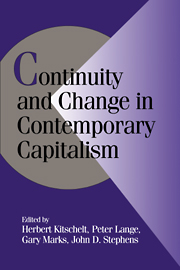Book contents
- Frontmatter
- Contents
- List of Contributors
- Preface
- Introduction
- PART I THE INTERNATIONAL SETTING FOR POLITICAL-ECONOMIC STRATEGIES
- PART II THE DYNAMICS OF DOMESTIC POLITICAL ECONOMIES
- 4 Divergent Production Regimes: Coordinated and Uncoordinated Market Economies in the 1980s and 1990s
- 5 The Political Economy of Europe in an Era of Interdependence
- 6 The Welfare State in Hard Times
- 7 Postwar Trade-Union Organization and Industrial Relations in Twelve Countries
- 8 Social Democratic Labor Market Institutions: A Retrospective Analysis
- 9 The Declining Significance of Male Workers: Trade-Union Responses to Changing Labor Markets
- PART III POLITICAL ECONOMY AND DEMOCRATIC COMPETITION
- PART IV CONCLUSION
- References
- Index
- Title in the series
9 - The Declining Significance of Male Workers: Trade-Union Responses to Changing Labor Markets
Published online by Cambridge University Press: 05 June 2012
- Frontmatter
- Contents
- List of Contributors
- Preface
- Introduction
- PART I THE INTERNATIONAL SETTING FOR POLITICAL-ECONOMIC STRATEGIES
- PART II THE DYNAMICS OF DOMESTIC POLITICAL ECONOMIES
- 4 Divergent Production Regimes: Coordinated and Uncoordinated Market Economies in the 1980s and 1990s
- 5 The Political Economy of Europe in an Era of Interdependence
- 6 The Welfare State in Hard Times
- 7 Postwar Trade-Union Organization and Industrial Relations in Twelve Countries
- 8 Social Democratic Labor Market Institutions: A Retrospective Analysis
- 9 The Declining Significance of Male Workers: Trade-Union Responses to Changing Labor Markets
- PART III POLITICAL ECONOMY AND DEMOCRATIC COMPETITION
- PART IV CONCLUSION
- References
- Index
- Title in the series
Summary
INTRODUCTION
In the past two decades two concurrent sociological changes have redefined the working class in many advanced industrialized countries. The first is the mobilization of women as workers. The second is the contraction of the manufacturing sector and the concomitant rise of the service sector. The combined effect of these changes has been to shrink the blue-collar working class of male breadwinners, which postwar trade unionism and social democracy took as its core constituency. In place of a homogenized male and blue-collar, unionized working class, unions are now facing a constituency consisting of a heterogeneous group of part-time, flex-time, and full-time workers comprising increasingly women and service-sector workers, mostly male post-Fordist industrial workers adapted to the computer revolution, and the remnants of traditional constituencies of male industrial workers and workers in crafts-oriented skilled occupations. With sociological diversity comes also diversity of interests and often increased conflict over strategy, aims, and style of interest representation.
This chapter examines some aspects of union responses to the changing composition of labor markets. The question of how unions have adjusted to growing diversity is linked to some core issues about the transformation of social democracy. The social democratic axiom that the individual rises with his or her group can only be true if the labor movement is inclusive enough to represent disadvantaged groups, among them women.
- Type
- Chapter
- Information
- Continuity and Change in Contemporary Capitalism , pp. 261 - 290Publisher: Cambridge University PressPrint publication year: 1999
- 6
- Cited by

